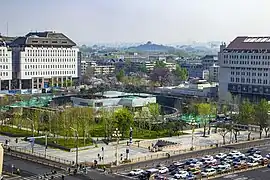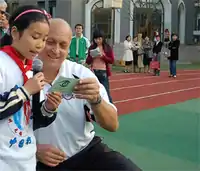Xidan
Xidan (Chinese: 西单; Pinyin: Xīdān) is a major traditional commercial area in Beijing, China.[1] It is located in the Xicheng District.[2]

The Xidan commercial district incorporates the Xidan Culture Square, North Xidan Street, as well as many supermarkets and department stores. The Xidan Cultural Square is the largest venue for cultural events with shopping nearby in downtown Beijing.[1]
Area
Xidan occupies around 80 hectares (197.7 Acres) within the Xicheng District.[3]
Name
.jpg.webp)
The name Xidan (literally, "West Single") came from the paifang that existed on one of the streets there.[4] In this context, the name "Xidan" refers to the single (单) paifang that existed on the west side (西) of the city.
The paifang was rebuilt in 2008, and now stands at the Xidan Culture Square.[5]
History
.jpg.webp)
.jpg.webp)
.jpg.webp)
Xidan began to develop in the Ming Dynasty as an area alongside the passage for traders from Southwestern China to enter Beijing. Restaurants and shops were eventually built for these merchants. Eventually, as the Western part of the city became the residential area for officials, Xidan became a commercial area. The location of several government agencies when Beijing was under the administration of the Republic of China also helped Xidan's economic growth.[6]
The area began to experience massive growth in the 1950s, as the population of Beijing began to move westwards.[7] By the 1970s, Xidan, along with Qianmen and Wangfujing, became the three major commercial areas in Beijing.[7]
Currently, the area is known throughout Beijing as a shopping area.[8][9][10] Many malls and department stores have stores within the area, the oldest of which is the China branch of the Taiwanese department store Chungyo.[9][11][12]
Xidan is also home to Lingjing Alley, which, at 32m (34 yards), is considered to be the broadest hutong in Beijing.[13]
Xidan Wall
Xidan Wall, also called Democracy Wall, is a long brick wall on Xidan Street. Erected in 1978, the event is generally recognized as the beginning of the Beijing Spring.[14] Xidan Wall played a significant role in the democracy movement in Beijing during the summer of 1979.[15] It was at that time where the wall received a significant number of posters that criticized China's leaders.[16] Even an award-winning Canadian journalist John Fraser put up his own "dazibao," whose notice about a lost gold signet ring that concluded in vague political sentiment bizarrely resulted in his addressing the 1979 summer masses in Tiananmen Square.[17] However, by December 1979, Beijing's municipal government banned the posting of wall posters on Xidan Wall in an attempt to curtail the democracy movement.[15] The municipal government instead allowed allow posters on a site within Yuetan Park,[16] a small park located in Beijing, but required registration with the city and an agreement to be "held responsible for political and legal implications of their messages."[15] Eventually, the most widely regarded poster writer for Xidan Wall, Wei Jingsheng, was sent to prison.[18]
Transportation
.jpg.webp)
The area is served by Xidan station, which is an interchange between Line 1 and Line 4 of the Beijing Subway system.[19] In addition, many Beijing Bus lines serve the area.[10][20]
Government and infrastructure
The Chinese Ministry of Education is headquartered in Damucang Hutong, Xidan.[21]
Education
Beijing Xidan Primary School (S: 北京市西单小学, P: Běijīng Shì Xīdān Xiǎoxué) serves Xidan.[22] The school's predecessor was a private school, Jiemin Primary School (洁民小学), established in 1934. The Ministry of Education took control in 1953. In 1958 Jiemin merged with Xidan Toutiao Primary School (西单头条小学) and Baimiao Primary School (白庙小学). The school received its current name in August 2002.[23]
Future

The Chinese Government has targeted Xidan in its 11th Five Year Plan, which is scheduled to conclude by 2010, with a stated mission of improving the area's environment, as well as diversifying the genre of stores that open in the area. Portions of the plan were already completed in the run up to the 2008 Olympic Games.[24][25]
References
- "Xidan Commercial Street". eBeijing. Archived from the original on November 20, 2008. Retrieved 2008-09-16.
- Xicheng district official website Archived December 4, 2008, at the Wayback Machine
- 街區簡介 (in Chinese). 北京市西城區人民政府 (The People's Government of Xicheng District, Beijing). Archived from the original on 2007-08-10. Retrieved 2008-09-17.
- 北京西单文化广场新装亮相 (in Chinese). Sohu. Retrieved 2008-09-17.
- "Xidan Cultural Square in Beijing". China Daily. 2008-07-25. Retrieved 2008-09-17.
- "Travel in Beijing: Xidan Commercial Street". sinohotel.com. Retrieved 2008-09-17.
- "西單商業區的歷史沿革 (The History of Xicheng Commercial Area)" (in Chinese). 北京市西城區人民政府 (The People's Government of Xicheng District, Beijing). Archived from the original on 2007-08-10. Retrieved 2008-09-17.
- "Xidan Area". Shoppinginbeijing.com. 2008-02-04. Retrieved 2008-09-17.
- "Xidan Shopping area, Beijing". 1800what.com. Retrieved 2008-09-17.
- "Xidan". holidaybeijing.com.cn. Retrieved 2008-09-17.
- "聯系我们 (Contact Us)" (in Chinese). Chungyo Department Store. Retrieved 2008-09-17.
- "Beijing Xidan Shopping Area". Beijing eTours Travel Service. Retrieved 2008-09-17.
- "Inside hutong history". China Daily. 2008-08-09. Retrieved 2008-09-17.
- Wei, Jingsheng (1999-09-27). "DEMOCRACY WALL: A Sudden Explosion of Free Speech, 1979 Unorthodox Opinions Are Heard on the Street". Time Asia. Time Inc. Archived from the original on January 29, 2001. Retrieved 2008-09-17.
- Ching, Frank (December 7, 1979). "Peking's Municipal Government bars posting of wall posters on Xidan wall (Democracy Wall)". Wall Street Journal. p. 34.
- Sterba, James P. (December 7, 1979). "Peking Closes Democracy Wall, Banishes Posters to Remote Park; Peking Closes Democracy Wall, Allotting More Remote Poster Area". Wall Street Journal. p. 1. Retrieved 2008-09-19.
- Leonard, John (December 16, 1980). "Books of the Times". New York Times. p. 9. Retrieved 2008-09-19.
- Hasluck, Nicholas (July 1, 2005). "The Gang of Four revisited". Quadrant. Quadrant Magazine Company, Inc. 79 (7–8): 18. Retrieved 2008-09-19.
- "地铁-公交换乘查询 (Inquiries about public transportation transfers)" (in Chinese). Beijing Subway. Archived from the original on October 12, 2008. Retrieved 2008-09-17.
- "Xidan Commercial Street". Travelchinaguide.com. Retrieved 2008-09-17.
- English home page Archived January 3, 2016, at the Wayback Machine. Ministry of Education (China). Retrieved on December 29, 2015. "Address: No.37 Damucang Hutong, Xidan, Beijing, P.R.C " - Chinese address: "地址:北京市西单大木仓胡同37号 邮编:100816"
- "首页 Archived September 20, 2012, at the Wayback Machine." Beijing Xidan Primary School. Retrieved on November 16, 2013.
- "学校简介." (Archive) Xidan Primary School. Retrieved on November 16, 2013.
- 奥运重点建设项目北京西单商业区基本完成改造 (in Chinese). 中青网 (youth.cn). 2008-07-22. Archived from the original on July 21, 2011. Retrieved 2008-09-17.
- ""十一五"時期西單現代商業區發展規划 (Modern Xidan Commercial Area's Development and Planning during the 11th Five Year Plan)" (in Chinese). 北京市西城區人民政府 (The People's Government of Xicheng District, Beijing). Archived from the original on 2007-08-10. Retrieved 2008-09-17.
External links
- Xidan Commercial Street from eBeijing, official website of Beijing government
- The Xidan Street
- Beijing Olympics Page on Xidan
- China.com Page on Xidan (in Chinese)
- Xidan Shopping Center (in Chinese)
- Beijing Xi Dan Primary School (in Chinese)